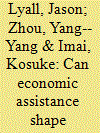| Srl | Item |
| 1 |
ID:
171339


|
|
|
|
|
| Summary/Abstract |
Governments, militaries, and aid organizations all rely on economic interventions to shape civilian attitudes toward combatants during wartime. We have, however, little individual-level evidence that these “hearts and minds” programs actually influence combatant support. We address this problem by conducting a factorial randomized control trial of two common interventions—vocational training and cash transfers—on combatant support among 2,597 at-risk youth in Kandahar, Afghanistan. We find that training only improved economic livelihoods modestly and had little effect on combatant support. Cash failed to lift incomes, producing a boom-and-bust dynamic in which pro-government sentiment initially spiked and then quickly reversed itself, leaving a residue of increased Taliban support. Conditional on training, cash failed to improve beneficiaries’ livelihoods but did increase support for the Afghan government for at least eight months after the intervention. These findings suggest that aid affects attitudes by providing information about government resolve and competence rather than by improving economic livelihoods.
|
|
|
|
|
|
|
|
|
|
|
|
|
|
|
|
| 2 |
ID:
119899


|
|
|
|
|
| Publication |
2012.
|
| Summary/Abstract |
Despite the Internet and the global nature of aid organizations, hundreds of millions of people still live in the information dark ages. Children die of dehydration in areas where the simple oral rehydration ingredients-water, salt, and sugar-are available, but health posters on how to use them are in a different language. Anti-retrovirals can be issued to HIV positive patients, but if the instructions on how to take them are in the wrong language, confusion about the drug regimen will lead to side effects and patients desisting with treatment. The issue is not access to treatment, but access to knowledge, and language is the barrier. Access to knowledge is the linchpin in the fight against poverty, exploitation and medical disparities, and "the language last mile" is the final hurdle to bringing knowledge to every corner of the world.
|
|
|
|
|
|
|
|
|
|
|
|
|
|
|
|